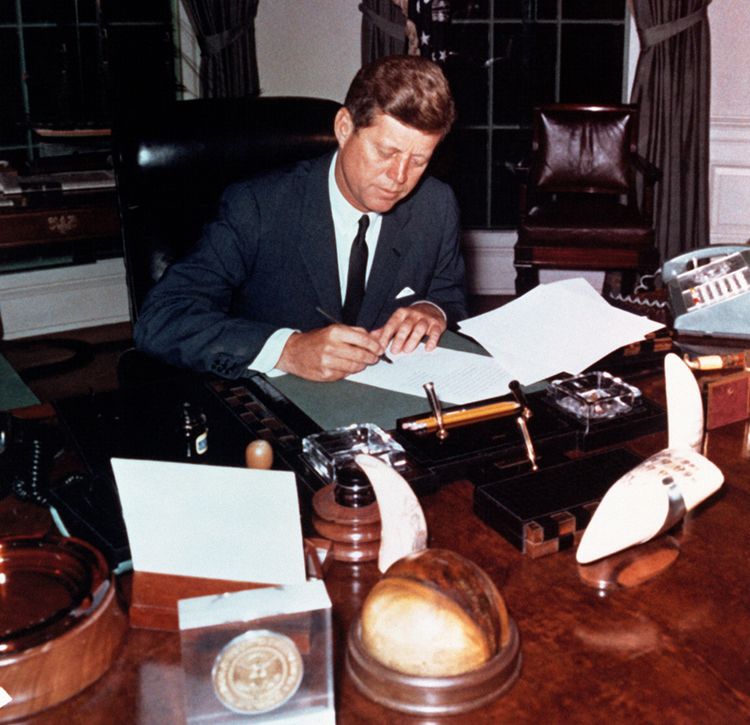Current Events Lesson Plan: May 25-31, 2017
Current Event: JFK 100
May 29th marked the 100th birthday of former President John F. Kennedy. Kennedy served as the 35th president of the United States from 1961 until his death in 1963. Many Americans saw Kennedy’s election and brief time in office—often idealized as “Camelot”—as an inspiring national renewal. Kennedy, a Democrat, won the 1960 presidential election with his “New Frontier” program after a series of television debates with then-Vice President Richard M. Nixon, his Republican opponent. At 43, JFK was the youngest man ever elected president. Kennedy won world respect as the leader of the Free World. In 1961, he created the Peace Corps, a volunteer organization that sent Americans abroad to help people in developing nations raise their standards of living. In 1962, JFK helped avert nuclear war with the Soviet Union during the Cuban missile crisis. The near-but-avoided calamity began a period of “thaw” in the Cold War as relations grew friendlier between the United States and Soviet Union. On the home front, the United States prospered under JFK. The economy steadily improved; African Americans made great progress in their quest for equal rights; and the United States made its first piloted space flights and prepared to send astronauts to the moon. On Nov. 22, 1963, Kennedy was assassinated while travelling in a motorcade through the streets of Dallas, Texas. Kennedy was buried at Arlington National Cemetery across the Potomac River from Washington, D.C.

John Fitzgerald Kennedy, the 35th president of the United States, served from 1961 to 1963. He was born 100 years ago this week on May 29, 1917. Credit: © Pictorial Press/Alamy Images
Objective:
The president of the United States is often considered the most powerful elected official in the world. The Constitution of the United States gives the president enormous power. However, it also limits that power. The authors of the Constitution wanted a strong leader as president, but they did not want an all-powerful king. As a result, they divided the powers of the United States government among three branches—executive, legislative, and judicial. The president, who is often called the chief executive, heads the executive branch. The president has many roles and performs many duties. As chief executive, the president makes sure that federal laws are enforced. As commander in chief of the nation’s armed forces, the president is responsible for national defense. As foreign policy director, the president determines United States relations with other nations. As legislative leader, the president recommends laws and works to win their passage. As head of a political party, the president helps mold the party’s positions on national and foreign issues. As popular leader, the president tries to inspire the people of the United States to work together to meet the nation’s goals. Finally, as chief of state, the president performs a variety of ceremonial duties. The Behind the Headlines news story and related World Book articles explore all of the presidents in U.S. history.
Words to know:
- Cold War
- Cuban missile crisis
- Government of the United States
- John Fitzgerald Kennedy
- Peace Corps
- President of the United States
- Union of Soviet Socialist Republics (U.S.S.R.)
Discussion Topics:
1. Ask your students to name some famous U.S. presidents other than John F. Kennedy. (Students might say George W. Bush, Bill Clinton, Dwight D. Eisenhower, Andrew Jackson, Thomas Jefferson, Abraham Lincoln, Barack Obama, Ronald Reagan, Franklin D. Roosevelt, Theodore Roosevelt, Donald Trump, George Washington, Woodrow Wilson.)
2. Ask your students to name people other than John F. Kennedy who were assassinated. (Students might say Benazir Bhutto; Julius Caesar; Franz Ferdinand; Mohandas Gandhi; James Garfield; Robert F. Kennedy; Martin Luther King, Jr.; Abraham Lincoln; William McKinley; Yitzhak Rabin; Anwar el-Sadat.)
3. Ask your students, “If you were to choose the greatest political leader from your country, who would you choose and why?”
4. Ask your students if they would want to be the political leader of their country. What would be some of the benefits and drawbacks of being the head of their country?
5. Ask your students to use World Book’s Timelines feature to view or add to the John Kennedy timeline. (Students may wish to use World Book’s “John Fitzgerald Kennedy” article for help.)


